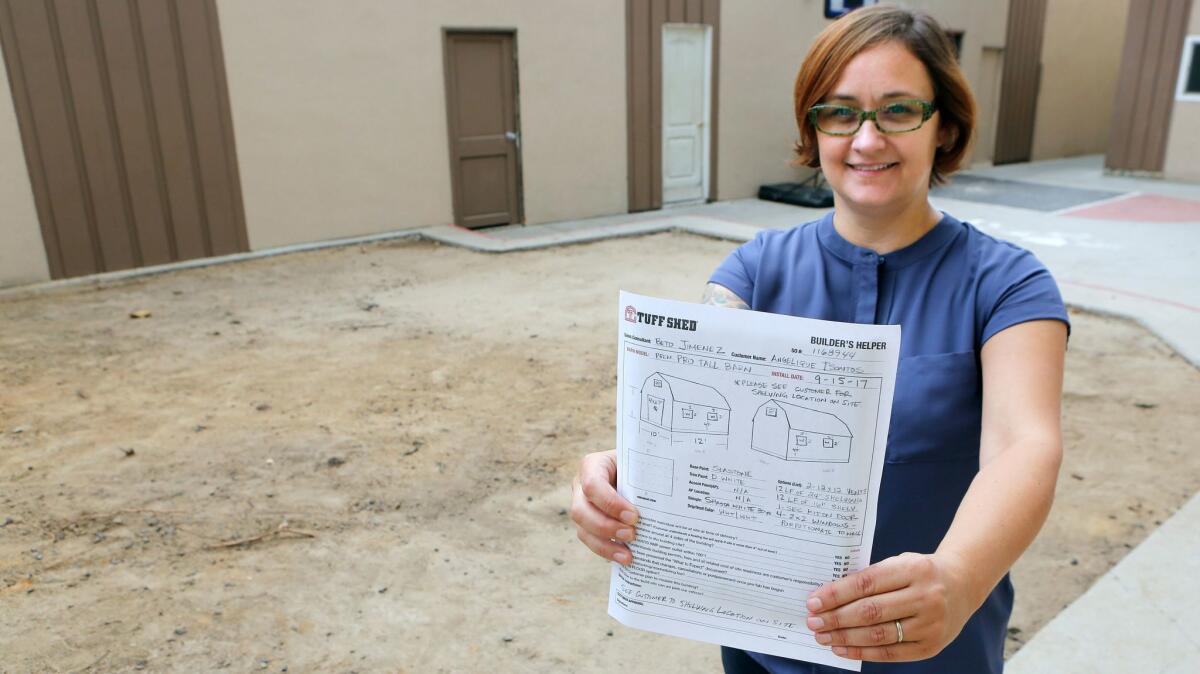O.C. domestic violence shelter houses pets of survivors alongside their owners

- Share via
Having already endured physical and emotional abuse from her husband, the Orange County woman knew it was time to leave when he threatened to harm her kitten.
So she took the kitten and her dog and fled, spending weeks in a homeless encampment before learning about a domestic violence shelter that recently began offering a safe haven for abuse victims and their pets.
In August, the Women’s Transitional Living Center — commonly known as the WTLC — became what is believed to be the first and only domestic violence shelter in Orange County to accept pets.
Today, the woman and her pets are safe, living in pet-friendly housing provided by the north Orange County-based WTLC.
“We were getting calls from families saying we can’t leave because we have pets,” said Gigi Tsontos, WTLC’s chief executive officer. “So, we knew (providing pet-friendly space) was really important.”
To help fund the center’s transition to a pet-friendly space, WTLC received a $6,000 Safe Housing grant from RedRover, a Sacramento-based animal welfare nonprofit that rescues pets from crisis situations.
WTLC was among five domestic violence shelters around the country to apply for and receive grant funding from RedRover to make their facilities pet friendly.
The AKC Humane Fund gave WTLC an additional $3,000.
Tsontos and her husband, owners of three dogs themselves, donated some of their own money.
The money will go toward construction of an insulated structure that will house pets, along with an outdoor roaming space, plus supplies and pet food.
“We were excited to see that Women’s Transitional Living Center applied for a Safe Housing grant, especially since they were the first pet-friendly domestic violence shelter in Orange County,” said Susan Robert, RedRover’s director of programs. “Any time we can help expand the opportunities to keep families and their pets together, it is rewarding for everyone.”
Any time we can help expand the opportunities to keep families and their pets together, it is rewarding for everyone.
— Susan Robert, RedRover’s director of programs.
While WTLC doesn’t keep statistics, Tsontos figures that about one in five abuse victims who call the center are pet owners reluctant to leave their pets behind.
Since WTLC started accepting animals, the nonprofit’s counselors ask every caller if there is a pet in the household.
One of those callers had been wanting to escape his abuser for at least a year, but stayed in the relationship because he couldn’t find a shelter that would take his dog.
Today, the dog and its owner are safe and living together in an apartment provided by WTLC.
A 1997 University of Utah study titled “Abuse of Animals and Domestic Violence: A National Survey of Shelters for Women Who Are Battered” surveyed 50 of the largest domestic violence shelters in the country. The survey revealed that 85% of women and 63% percent of the children living in those shelters reported incidents of pet abuse in their homes.
According to the National Coalition Against Domestic Violence, 70% of women entering shelters reported that their batterer had injured, killed, or threatened family pets for revenge or psychological control and 48% of abuse victims won’t leave their abusers out of fear of their pets being harmed after they leave.
Currently, pet owners living in WTLC housing share living space with their pets, Tsontos said.
WTLC will use the grant funding to help pay for the construction of an insulated outdoor structure that will house larger pets.
“We really want them (the pets) to stay with their parents,” Tsontos said. “But this will give us the ability to have that extra space.”
An outdoor exercise area is also being prepared, Tsontos said.
WTLC’s initial investment will be about $15,000 and pay for building the structure, landscaping, supplies, toys and food. The cost of maintaining pet friendly services will run about $5,000 annually.
WTLC will soon have the ability to provide housing for 16 animals at a given time.
Along with cats and dogs, rabbits, hamsters, guinea pigs, ferrets, gerbils, rats, mice and fish will be welcome.
WTLC also partners with local veterinarians and animal shelters to provide housing for pets unable to live with their owners at WTLC, due to size or city ordinances.
“Even if we have only five or 10 animals, at least we’ve made a difference for those families” Tsontos said.
LOU PONSI is a contributor to Times Community News.
All the latest on Orange County from Orange County.
Get our free TimesOC newsletter.
You may occasionally receive promotional content from the Daily Pilot.





